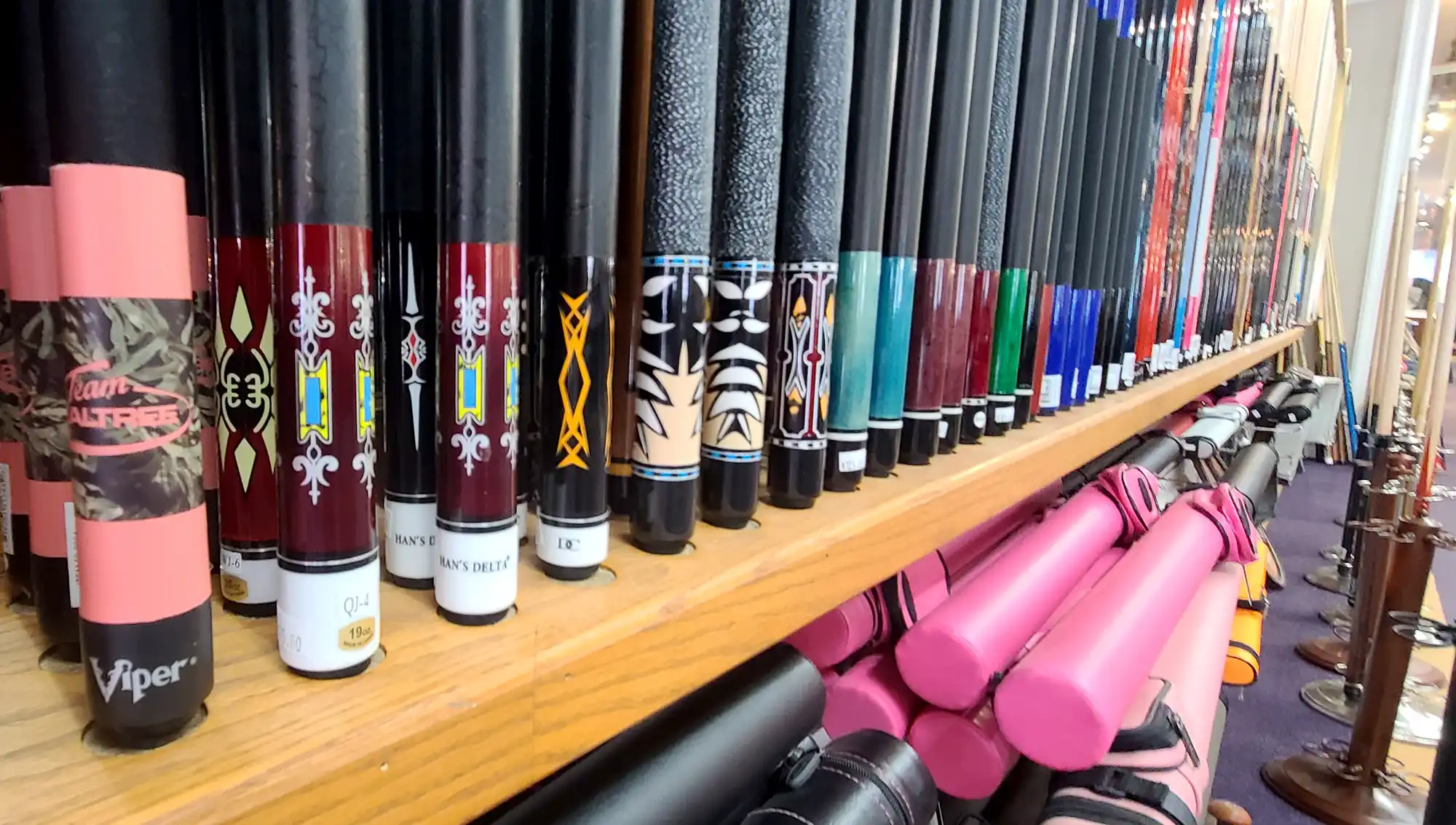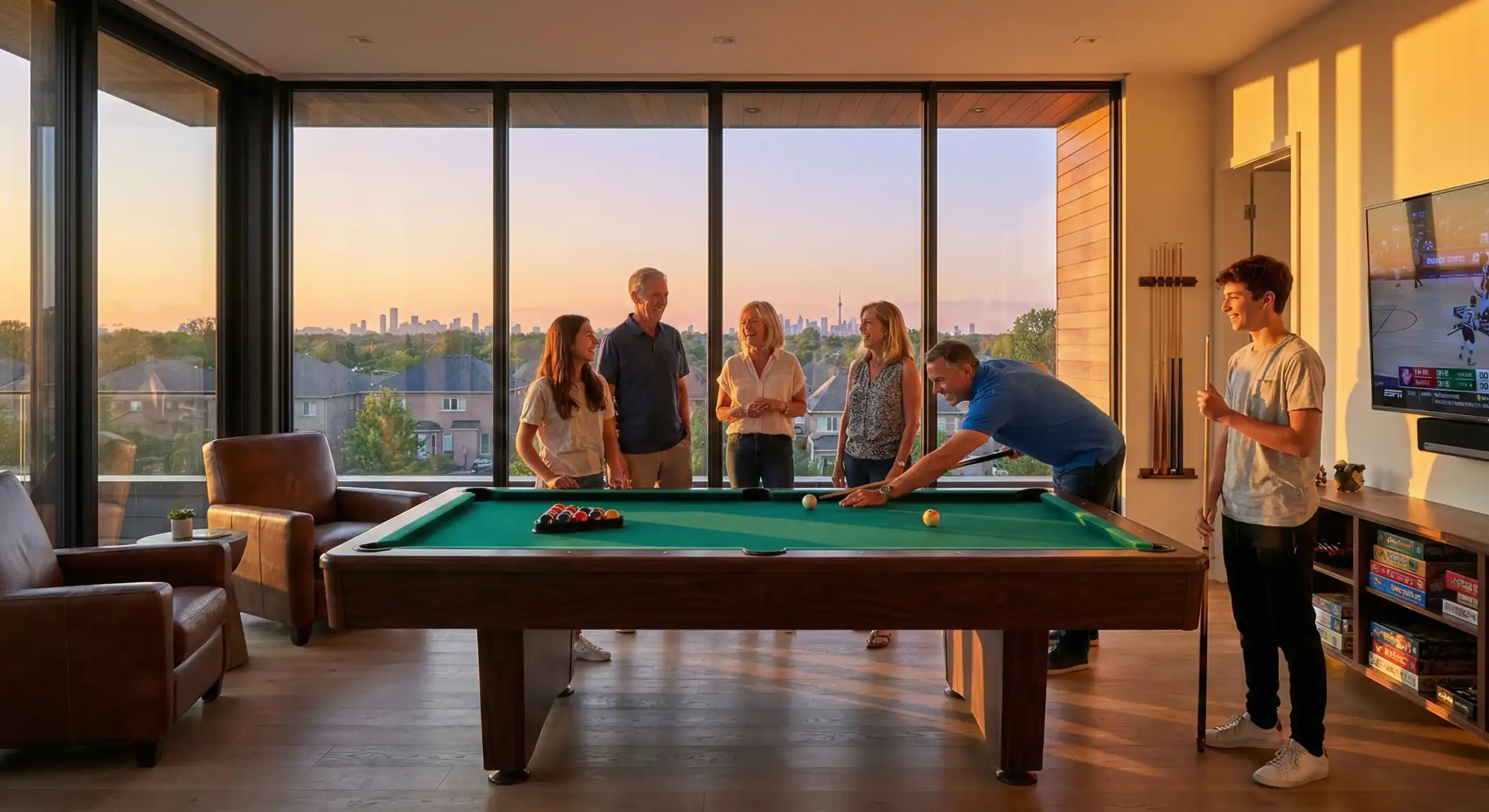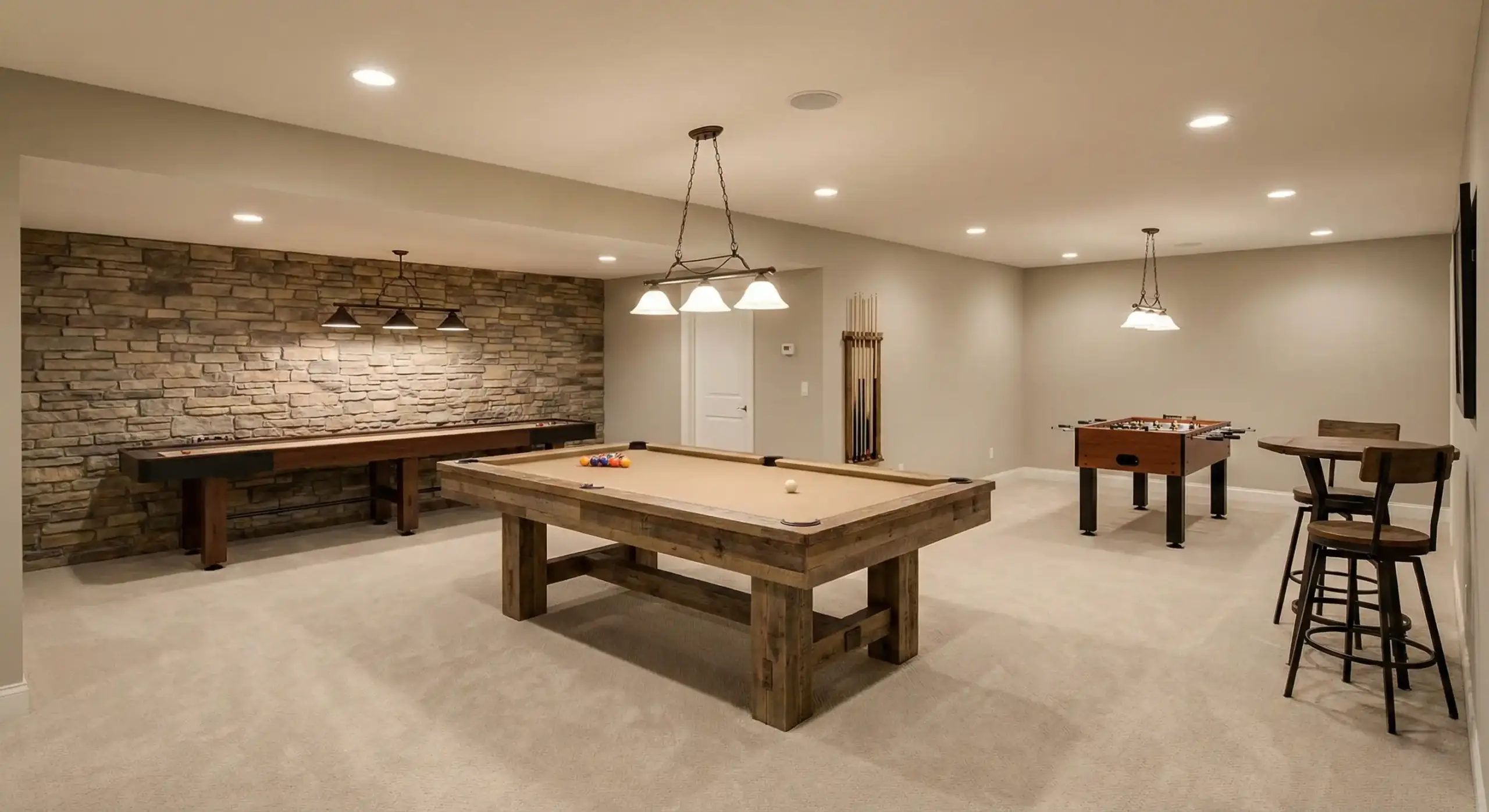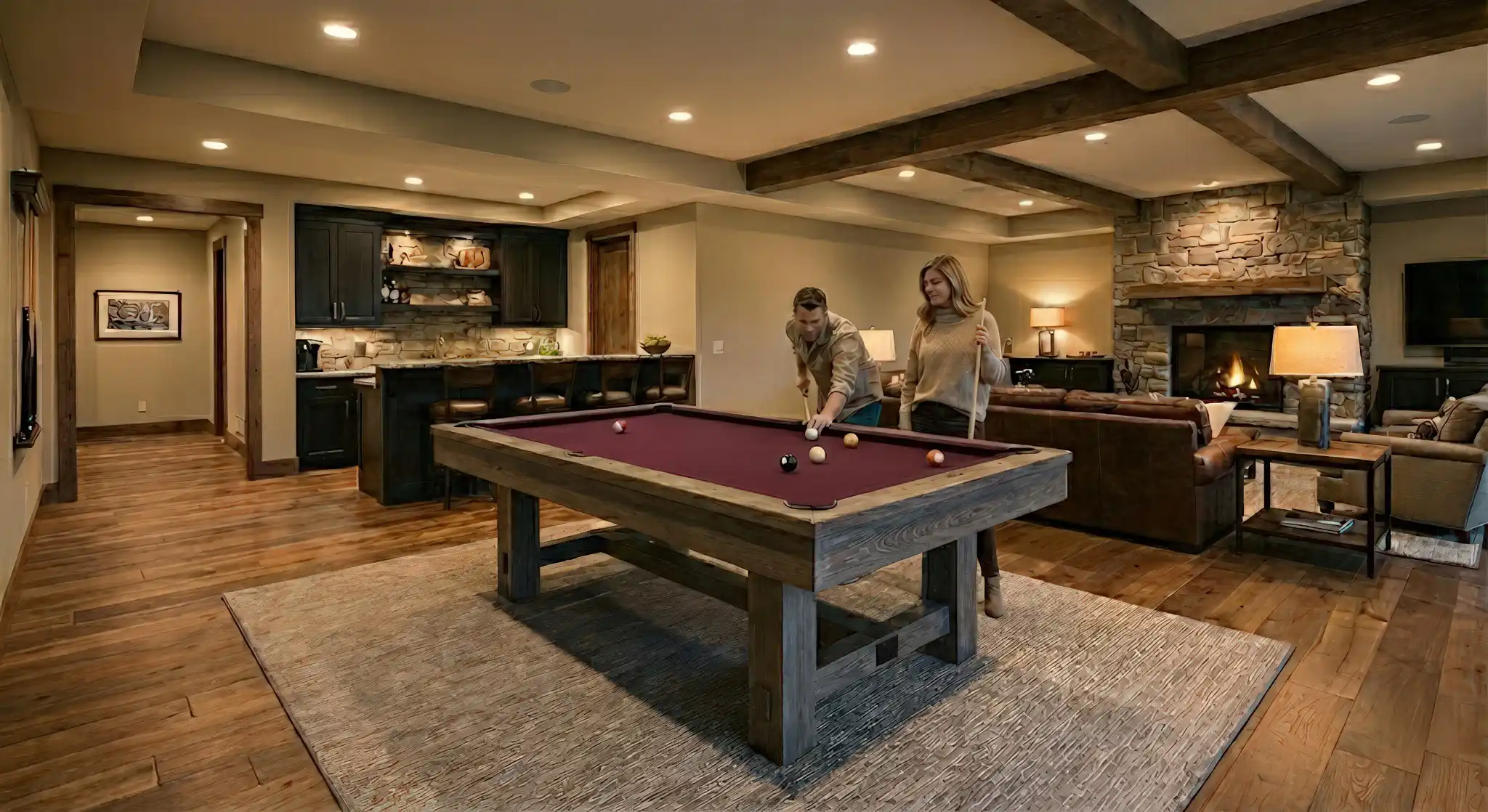Stepping into the world of pool is exciting, but choosing your first piece of equipment can feel overwhelming. With so many options, how do you find the right beginner pool cue? Selecting a cue that suits your needs from the start is key to developing your skills and truly enjoying the game. This guide, drawing on insights relevant to Pool Table Store, will walk you through the essential factors in choosing a pool cue, helping you find the perfect fit to begin your journey.
Introduction
Choosing your first pool cue is a crucial step for any new player. Unlike the often worn-down house cues found at pool halls, owning your own cue ensures consistency and allows you to get comfortable with a specific weight and feel, which is vital for improving your stroke. This pool cue buying guide focuses on what beginners should look for, covering everything from pool cue weight and pool cue length to the pool cue tip and wrap. We’ll explore the features that make a great beginner pool cue, ensuring you have the knowledge to select a quality cue, like those available from trusted brands at Pool Table Store.
Understanding Pool Cue Weight for Beginners
The weight of a pool cue significantly impacts control and power. Most experts recommend a pool cue weight between 18 and 21 ounces for beginners.
Finding Your Balance: Lighter vs. Heavier Cues
- Lighter Cues (18-19 oz): Offer enhanced control and maneuverability, often helpful for learning finesse shots.
- Heavier Cues (20-21 oz): Can generate more power, which might assist with break shots or long-distance plays.
- Recommended Starting Point: Many instructors suggest a 19 or 20-ounce cue as a balanced starting point, providing a good mix of control and weight without feeling too heavy.
Experimenting with different weights, if possible at a location like Pool Table Store’s Mississauga showroom, is the best way to find what feels most comfortable.
Choosing the Right Pool Cue Length
Standard pool cue length is typically 57 to 58 inches, suitable for most adults. While shorter cues (48-52 inches) exist for younger players or tight spaces, a standard 58-inch cue is generally recommended even for shorter adults to ensure proper reach across the table. The key is selecting a length that allows for a comfortable stance and smooth stroke. Considering your playing environment is part of choosing a pool cue that works for you.
Material Matters: Shaft and Butt Construction
The materials used in a pool cue affect its feel, durability, and performance.
The Shaft: Maple Pool Cue Popularity
Maple wood… is a highly recommended choice for a beginner pool cue shaft.
- Feel: Provides a smooth glide through the hand during a stroke.
- Durability: Known for its longevity and resistance to minor impacts.
- Performance: Offers good flexibility and feedback.
While composite materials exist, a maple pool cue is a reliable and popular starting point.
The Butt and Overall Feel
The butt of the cue contributes to balance and aesthetics, often made from various woods or composites to complement the shaft. Understanding how the parts work together helps in choosing a pool cue that feels balanced in your hands.
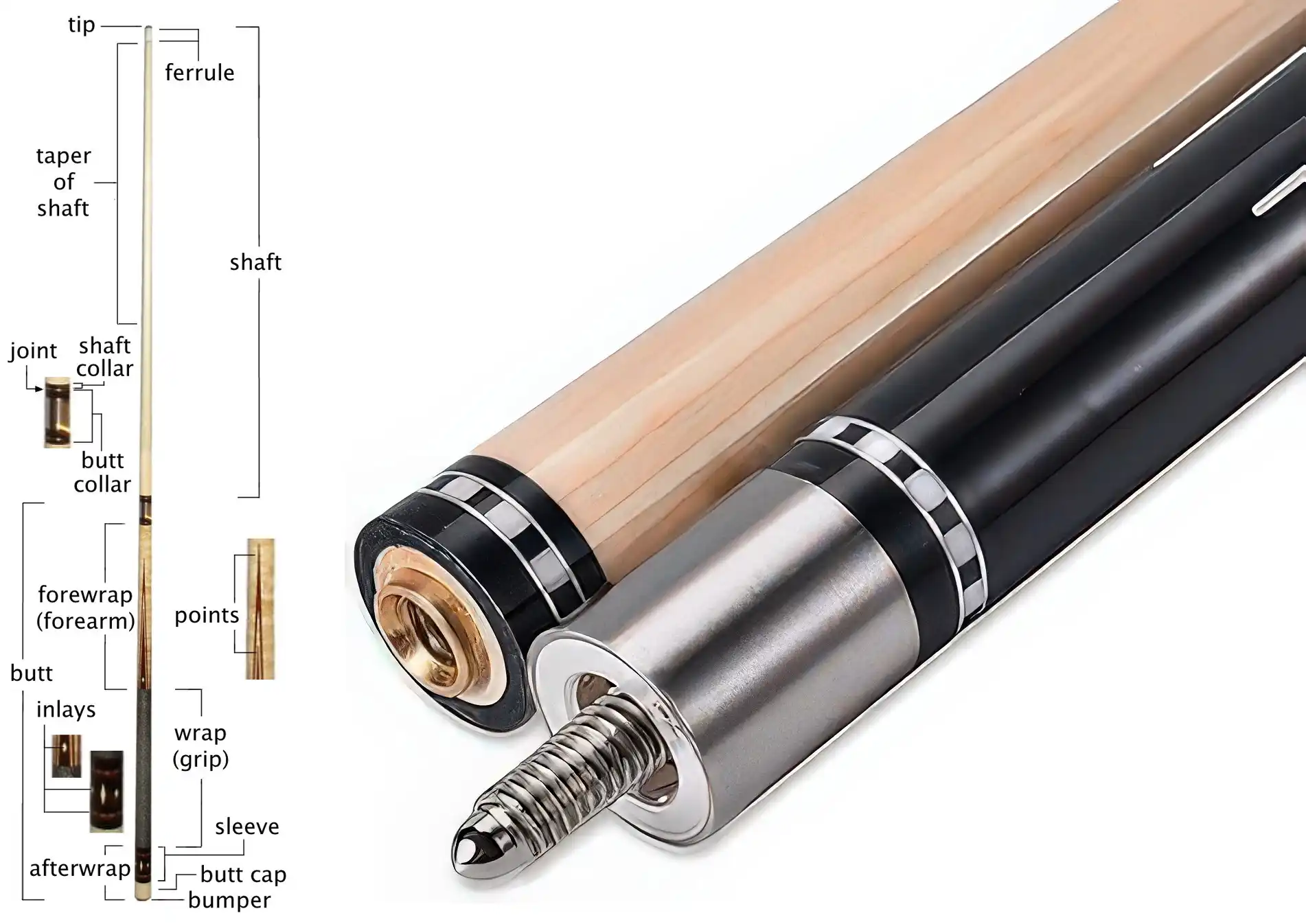
Selecting the Ideal Pool Cue Tip
The pool cue tip is where the action happens, making direct contact with the cue ball. Size and hardness are key factors.
Tip Size and Forgiveness
A diameter between 12mm and 13mm is generally advised for beginners. A larger tip (around 13mm) provides a bigger contact area, offering more forgiveness on off-center hits – a common occurrence for new players.
Tip Hardness: Finding the Sweet Spot
Medium-hard tips are often recommended for beginners.
- Benefit: They balance control and durability well.
- Comparison: Softer tips offer more spin but wear faster, while harder tips last longer but provide less spin.
Understanding Pool Cue Joints
For two-piece cues, the pool cue joint connects the shaft and butt.
- Common Materials: Stainless steel or brass joints are standard in beginner cues, providing a solid connection.
- Thread Types: Common types include the 5/16 x 18 thread, which is reliable and widely used. Other types like Uni-Loc or wood-to-wood joints exist but aren’t essential for a first cue. A secure pool cue joint ensures consistent energy transfer during a shot.
Grip and Comfort: The Pool Cue Wrap
The pool cue wrap covers the lower part of the cue, providing grip. Wrap choice is largely personal preference.
Common Wrap Materials
- Irish Linen: Smooth feel, good sweat absorption.
- Leather: Comfortable grip, often found on slightly higher-priced cues.
- Rubber/Synthetic: Enhanced, sometimes tacky grip, good for sweaty hands.
- No Wrap: Some players prefer the direct feel of the wood.
It’s generally advised to avoid cheap nylon wraps which can unravel. Trying different wraps can help you decide what feels best.
Determining Your Beginner Pool Cue Price
Quality is important, but you don’t need to break the bank for your first cue.
- Recommended Range: Good quality beginner pool cues typically range from $60 to $200. A cue in the $50 to $150 pool cue price range often provides a great balance of playability and durability.
- Value: Even an inexpensive two-piece maple pool cue is usually a significant step up from standard house cues.
Investing wisely ensures you get a cue that helps, not hinders, your progress.
Beginner Cue Characteristics Overview
Choosing your first cue involves balancing several factors. Here’s a quick summary based on common recommendations:
| Feature | Beginner Recommendation | Benefit |
| Weight | 19-20 oz | Good balance of control and power |
| Tip Size | ~13 mm | More forgiving on off-center hits |
| Shaft Material | Maple | Smooth feel, durable, good performance |
FAQ
What pool cue weight is best for a beginner?
- A weight between 19 and 20 ounces is often recommended as a starting point, offering a good balance between control and power for learning the fundamentals.
What should I look for in a beginner pool cue tip?
- Look for a medium-hard pool cue tip around 13mm in diameter. This offers a good combination of durability and forgiveness for players developing their stroke accuracy.
Is a maple pool cue good for beginners?
- Yes, a maple pool cue is an excellent choice. It’s durable, provides a smooth stroke, and offers good feel and performance, making it a popular and reliable option for first-time cue buyers.
How much should I spend on my first pool cue?
- A budget between $60 and $200 is realistic for a quality beginner pool cue. Investing in the $50-$150 pool cue price range often yields a durable cue that plays significantly better than house cues.
How does selecting the pool cue influence the choice of a cue case?
- A well-fitted case ensures your cue is protected from damage, maintains its straightness, and facilitates easy transport. For instance, a two-piece cue benefits from a case with padded compartments that prevent jostling, while a one-piece cue requires a longer, rigid case to safeguard its structure.
Conclusion
Choosing your first beginner pool cue is an investment in your enjoyment and improvement in the game. By focusing on key factors like a comfortable pool cue weight (likely 19-20 oz), standard pool cue length, a forgiving pool cue tip (~13mm medium-hard), a durable maple pool cue shaft, and a comfortable pool cue wrap, you can make an informed decision. Remember that even a modest investment in a personal cue offers more consistency than using house cues. Understanding these elements outlined in this pool cue buying guide will help you select a cue that feels right and supports your development as a player.
Visit the Pool Table Store showroom in Mississauga or contact Pool Table Store for expert advice on selecting your ideal beginner pool cue today.

